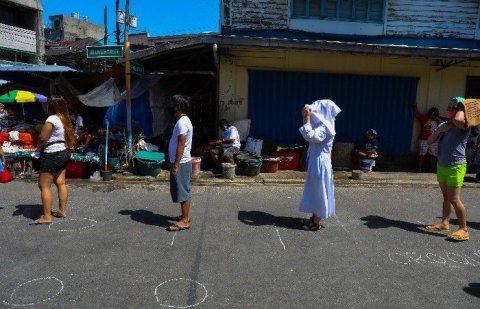Below is the list of general community quarantine or GCQ frequently asked questions and answers.

Palace announced Tuesday that areas under ECQ except for Metro Manila, Laguna and Cebu City would shift to GCQ or general community quarantine starting May 15.
Here are the areas that will be under general community quarantine after May 15:
– Region II
– Region III
– Region IV-A – except Laguna
– CAR
– Region VII – except Cebu City
– Region IX
– Region XI
– Region XIII
GCQ frequently asked questions and answers
Who is allowed to go out during GCQ?
- Health Workers (Doktor, nurse, hospital/clinic employees)
• Government officials and frontline personnel.
• Pastors, priests, imams, at other religious ministers that are administering necrologic or funeral rights
• Bank employees
• Media
• Security personnel
• Repatriated OFWs with approved quarantine protocols
• Veterinarians and veterinary clinic employees
Who is prohibited from leaving their homes?
- Persons below 21 years old
- Persons 60 years old and above
- Those who have pre-existing conditions or high-risk/vulnerable
- Pregnant women
There will be an exception if the said individuals needed to buy essential goods and services.
Wearing of face mask and observing physical distancing is mandatory.
Curfew hours are still implemented in GCQ areas.
Are there public transport vehicles such as jeeps, tricycles, buses?
Yes, but they are only allowed at a “reduced capacity.”
Ships and other marine vehicles and airplanes can travel, but only for food and cargo transfers. No passengers are allowed.
Also read: DOTr issues ‘new normal’ guidelines for PUVs, private vehicle
What are the businesses or establishments open under GCQ?
- Hospitals, medical clinics, dental and EENT clinics
- Retail establishments (groceries, supermarkets, hypermarkets, convenience stores, pharmacies, drug stores, and public markets)
- Banks at capital markets
- Food preparations/restaurants (take out only)
- Logistics service providers (cargo handling, warehousing, trucking, freight forwarding, and shipping line)
- Power, energy, water, IT & telecommunications supplies and facilities, waste disposal services, technical services
- Postal and courier services
- Veterinary activities
- Security & Investigation activities
- Programming & broadcasting activities
- Rental & leasing activities (except for entertainment/mass gathering purposes)
- Gasoline stations
- Laundry shops (including self-service)
- Funeral services
- Export companies (with temporary accommodation and shuttle services; work from home arrangements)
- Mining & quarrying
Other manufacturing activities:
• Beverages
• Cement and steel
• Electrical machinery
• Wood products, furniture
• Non-metallic products
• Textile/wearing apparels
• Tobacco products
• Paper and paper products
• Rubber and plastic products
• Coke and refined petroleum products
Other non-metallic mineral products
• Computer, electronic and optical products
• Electrical equipment
• Machinery and equipment
• Motor vehicles, trailers, and semi-trailers
• Other transport equipment
• Malls and commercial centers (including hardware stores, clothing, and accessories and non-leisure stores)
• Barbershops, salons, spas and other personal care industries (with strict health standards)
• Wholesale and retail trade and repair of motor vehicles and motorcycles
• Construction and Build, Build, Build
• Forestry and logging
• Publishing activities
• Motion picture, video and television program production, sound recording and music publishing activities
• Advertising and market research
• Real estate activities (except buying and selling)
• Office administrative, office support and other business activities
• Legal and accounting
• Insurance, reinsurance, and pension funding except for compulsory social security
• Architecture and engineering activities, technical testing analysis
• Scientific and research development
• Other professionals, scientific and technical activities
• Social work activities without accommodation
• Government office – frontline offices
GCQ frequently asked questions
What businesses or establishments are not allowed to open?
Businesses and establishments related to “leisure or entertainment:”
- gyms
- fitness studios
- sports facilities
- bars
- pubs
- theaters
- cinemas
- libraries
- museums
Are schools going to reopen?
- CHED allows higher education institutions through flexible learning arrangements to finish the school year 2019-2020.
- Schools may reopen on limited capacity and to accept requirements only, prepare, and releasing credentials of students.
- This also means that some of our teachers also have the opportunity to work, based on the DOH and CHED protocols.
Are mass gatherings allowed?
NO. Mass gatherings like movie screenings, concerts, sporting events, and other entertainment activities are STILL PROHIBITED and HIGHLY DISCOURAGED.
Only essential work and religious gatherings are allowed as long as strict physical distancing is maintained.
